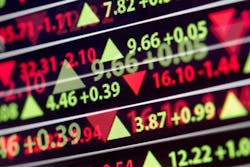The Federal Reserve said on Dec. 15 it will end its stimulus bond-buying program more quickly amid a rising threat from inflation, but keep interest rates at zero until labor market conditions improve further.
The Fed will cut monthly bond purchases by $30 billion a month, double its previous rate of tapering, the Federal Open Market Committee (FOMC) said at the conclusion of its two-day meeting, which would end the program in March and open the door for the central bank to increase the benchmark borrowing rate.
Forecasts from committee members indicate they see as many as three rate hikes next year, though inflation is expected to decline.
Federal Reserve Chair Jerome Powell was upbeat on the U.S. economic outlook, saying that growth will remain "robust," despite inflation running above the central bank's two percent target.
"Economic activity is on track to expand at a robust pace this year, reflecting progress on vaccinations and the reopening of the economy. Aggregate demand remains very strong," Powell said but noted that the rise of the Omicron variant of Covid-19 poses a risk to the recovery.
Wall Street stocks rocketed higher on Dec.15 after the Federal Reserve signaled a more muscular stance on inflation by accelerating plans to tighten monetary policy.
The benchmark Dow Jones Industrial Average advanced 1.1% to 35,927.43.
The broad-based S&P 500 gained 1.6% to 4,709.85, while the tech-rich Nasdaq Composite Index jumped 2.1% to 15,565.58.
After admitting recently that he and his colleagues miscalculated how far prices would rebound in the wake of the pandemic crisis, Fed Chair Jerome Powell has pledged to fight back.
"The fact that the Fed took an aggressive stance is pleasing to the market because they have admitted they were wrong on inflation and that they are going to deal with the inflation problem," said Peter Cardillo of Spartan Capital. "That's a positive, not a negative."
Art Hogan, chief strategist at National Securities, said investors were heartened the much-anticipated Fed announcement did not include any steps that exceeded the market's expectations in terms of hawkishness, such as immediately ceasing stimulus purchases.
"Everything that happened today was within consensus expectations," Hogan said.
Inflation has risen quickly as a top worry for markets after several reports showing historic spikes in consumer and producer prices.
Copyright 2021, Agence France-Presse
About the Author
Agence France-Presse
Copyright Agence France-Presse, 2002-2025. AFP text, photos, graphics and logos shall not be reproduced, published, broadcast, rewritten for broadcast or publication or redistributed directly or indirectly in any medium. AFP shall not be held liable for any delays, inaccuracies, errors or omissions in any AFP content, or for any actions taken in consequence.
